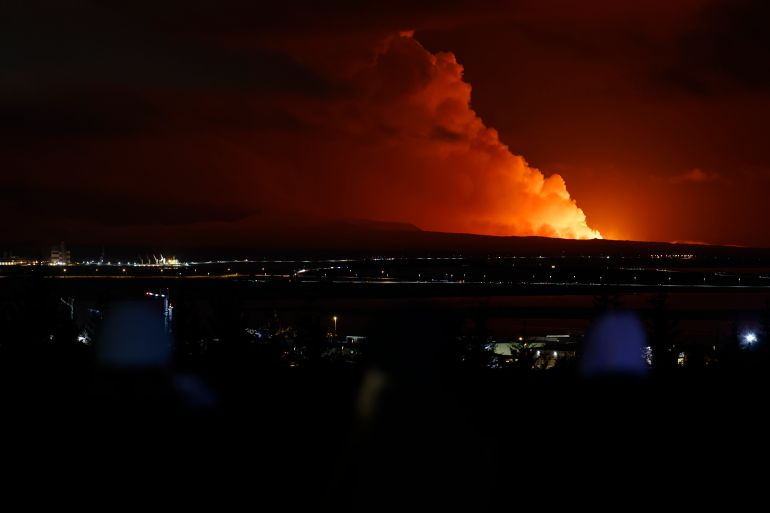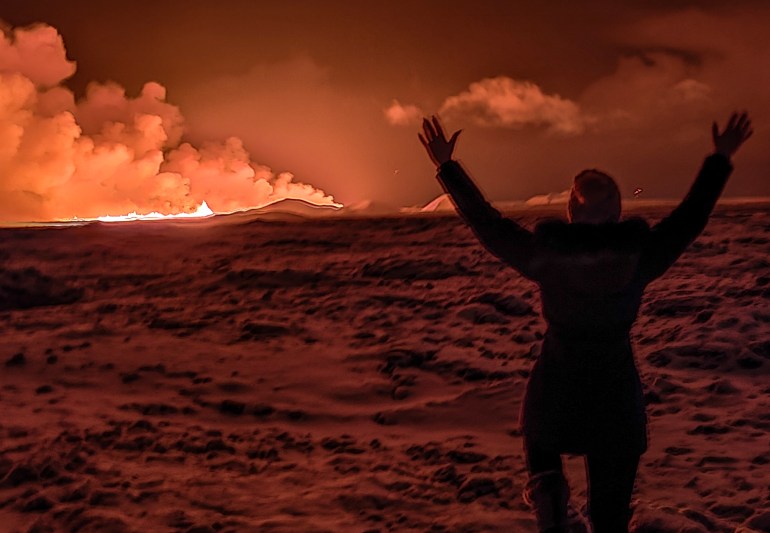Iceland volcano erupts weeks after thousands evacuated from nearby town
Iceland was on high alert for an eruption on the Reykjanes peninsula after weeks of intense seismic activity.

A volcano in southwest Iceland has erupted, spewing lava and smoke across a wide area weeks after nearly 4,000 residents of a nearby town were evacuated amid intense seismic activity.
The eruption started at about 10:17pm (22:17 GMT) on Monday on the Reykjanes peninsula, turning the sky orange and prompting the country’s civil defence to be on high alert. It appeared to have taken place about 4km (2.4 miles) from the town of Grindavik, the Icelandic Meteorological Office (IMO) said.
Keep reading
list of 4 itemsIceland to shield geothermal plant from risk of volcanic eruption
Iceland braces for volcanic eruption as thousands evacuated
Volcanic eruption could destroy Icelandic fishing town, say experts
The livestreamed footage of the eruption showed glowing orange lava rising into the night sky, surrounded by billowing red smoke.
“The eruption does not present a threat to life,” an Icelandic government statement said, while Prime Minister Katrin Jakobsdottir wrote on Facebook that the country hopes “for the best but it is clear this is a considerable eruption”.
The IMO said the eruption opened a 4km (2.5 mile) fissure from which lava fountains emerged. But at its southernmost point, the crack was still 3km (1.8 miles) away from Grindavik, the closest fishing town where authorities evacuated nearly 4,000 inhabitants last month due to fears of an imminent eruption after thousands of small earthquakes rattled the region.
Residents have only been allowed to make brief visits to the town since then.
“The eruption is taking place north of the watershed, so lava does not flow towards Grindavik,” geologist Bjorn Oddsson said.

Some 100 to 200 cubic metres (3,530 to 7,060 cubic feet) of lava emerged per second, several times more than in previous eruptions in the area, Icelandic seismologist Kristin Jonsdottir told the public broadcaster RUV.
Magnus Tumi Gudmundsson, a scientist who flew over the site on Tuesday morning on a coastguard research flight, told RUV that he estimates twice as much lava had already spewed than the entire monthlong eruption on the peninsula this summer.
Gudmundsson said the eruption was expected to continue decreasing in intensity but that scientists have no idea how long it could last. “It can be over in a week, or it could take quite a bit longer,” he said.
Police said they had raised their alert level and the country’s civil defence authorities warned the public not to approach the area and for tourists to stay away while emergency personnel assessed the situation.
“This is not a tourist attraction and you must watch it from a great distance,” Vidir Reynisson, head of Iceland’s Civil Protection and Emergency Management, told RUV.
“We now wait to see what the forces of nature have in store,” Iceland’s President Gudni Thorlacius Johannesson wrote on X, saying that “protecting lives and infrastructure” are the main priority for officials. “Civil Defence has closed off the affected area … We are prepared and remain vigilant.”
An eruption has begun near the evacuated town of Grindavík. Our priorities remain to protect lives and infrastructure. Civil Defence has closed off the affected area. We now wait to see what the forces of nature have in store. We are prepared and remain vigilant.
📷 @Vedurstofan pic.twitter.com/yKx4WKU61c— President of Iceland (@PresidentISL) December 19, 2023
Reykjanes is a volcanic and seismic hotspot southwest of Iceland’s capital Reykjavik.
In March 2021, lava fountains erupted from a 500 to 750-metre-long (1,640-2,460-foot-long) fissure in the ground in the Fagradalsfjall volcanic system.
Grindavik is close to Keflavik airport, Iceland’s main facility for international flights. After Monday’s eruption, the airport remained open, albeit with numerous delays listed for arrivals and departures.
Iceland’s Foreign Minister Bjarne Benediktsson said on X, that there were no disruptions of flights to and from Iceland and international flight corridors remain open.
A volcanic eruption has started on the Reykjanes Peninsula. The eruption is about 3,5 km long close to Sundhnúka, north of Grindavik where evacuation orders have been in place. There are no disruptions to flights to and from Iceland and international flight corridors remain open. pic.twitter.com/w9YB5wa6HR
— Bjarni Benediktsson (@Bjarni_Ben) December 19, 2023
The most disruptive in recent times was the 2010 eruption of the Eyjafjallajokull volcano, which spewed huge clouds of ash into the atmosphere and grounded flights across Europe for days because of fears ash could damage aeroplane engines.
Iceland is home to 33 active volcano systems, the highest number in Europe.
It straddles the Mid-Atlantic Ridge, a crack in the ocean floor separating the Eurasian and North American tectonic plates.